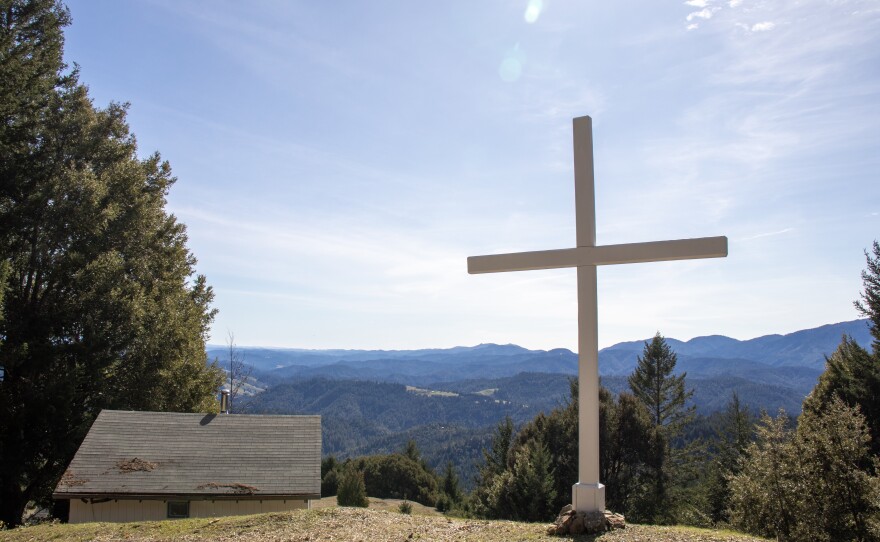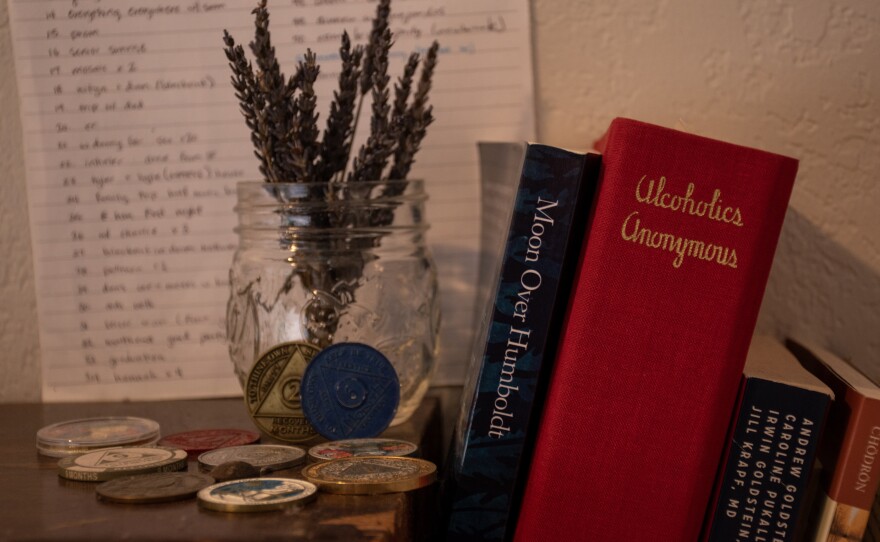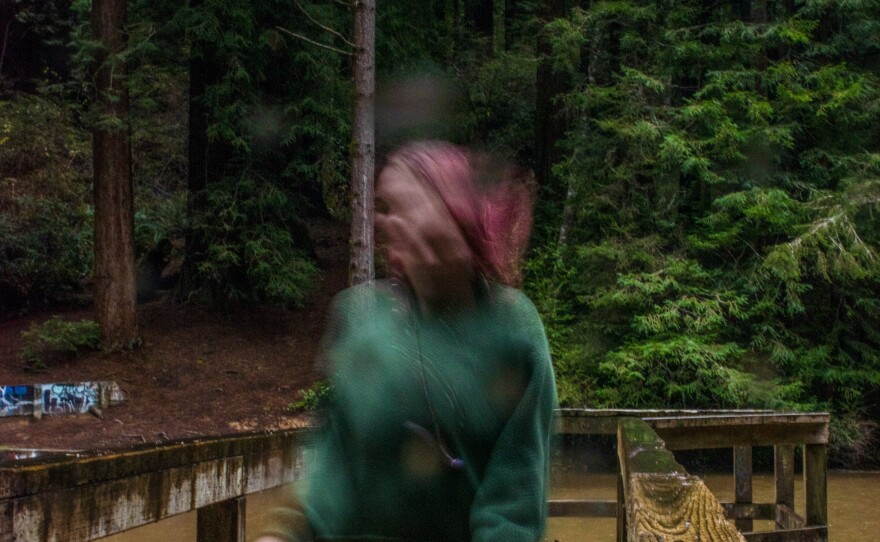This story was originally published in Osprey Magazine
A curtain of fog, or perhaps a veil of smoke, appears as you drive North on Highway 101. As the scent of marijuana comes through the car vents, your destination becomes clear: Humboldt County– the epicenter of California’s emerald triangle. Cannabis farming isn’t just an agricultural pursuit in the area, it’s a culture, a way of life and a societal norm. So– what does it mean to break away from the mainstream that defines your community?
For some, sobriety exists on a spectrum, ranging from a means of survival to merely a trend. With mainstream media normalizing sobriety fads like Dry January and semi-sobriety approaches like California sober, being on the wagon has become more complicated than ever.
In this leafy echochamber, with dispensaries lining every block and college kids looking to party, it can be difficult to imagine a substance free life. Mental health issues run rampant within the area’s stormy and dreary atmosphere, aiding in the struggle for sobriety. Yet for some, it’s the perfect place to recover. For a place tucked away in the trees, Humboldt County has a number of resources for folks looking for support.
For many, Arcata is considered the heart of Humboldt, and the plaza is seen as the heart of Arcata—as well as a trigger for substance use. This town square, historically parallel to a row of dive bars—Everett’s Club, Toby & Jack’s, The Alibi, and Sidelines Sports Bar, most of which have now closed—was dubbed Tavern Row and holds strong memories. Those who experienced Tavern Row at its peak describe sobriety today as far different than it was then.
Cassandra May, currently a Blue Lake resident, reminisced on the social scene pre-pandemic.
“With those four bars existing, there was more diversity of nightlife. You go to TJs to play pool; you go to Sidelines to dance… If you want a quiet place, you go to Everett’s,” May said. “The Alibi [consisted of] people who were getting off work… I went there with coworkers.”
People who have moved to Humboldt from elsewhere may remember their first time at the plaza. The bright colors of pastel artwork on the sidewalk, the smell of farmers market produce, hippies slacklining, or maybe a safe place to stand while watching people navigate giant artistic sculptures to the starting line of the Kinetic Sculpture Race.
Jim Hight, local author of the fictional book Moon Over Humboldt, paints a nonfictional portrait of how addiction shatters lives and what recovery can look like. Themes from Hight’s own recovery journey appear throughout the novel, especially in Jonah—a young activist battling a marijuana addiction—and Bill—a seasoned logger navigating fatherhood and the grief of loving an addict. The story follows two men who are objectively polarized and how they connect with themselves, each other, and their loved ones through 12-step recovery.
In “Moon Over Humboldt”, Jonah recalls his first encounter with this iconic hub saying, “The town’s central plaza, lush with damp grass. Parents chatted over their strollers, panhandlers held cardboard signs asking for money, clumps of young people lounged on blankets, beating drums and playing guitars, drinkers hid their bottles, and weed dealers tried to look casual.”
It is clear Hight drew from personal experience when creating this scene.
“We were just beguiled by the vibe [of the plaza]. At the time there was an outdoor musician, there were people hanging out…There was this group called Food Not Bombs, that were giving people free food,” Hight said, recalling what inspired him to initially move to Humboldt from Boston. “Then the plaza became a hazardous place for me to go because I was trying to quit pot. And it was clandestine at the time. It was still illegal, mostly. So, you could get it there. You could meet, make connections, and people would offer it to you, to sell to you…and you'd smell it all the time.”
One Humboldt bartender, who asked to remain anonymous, recalls their potent Halloween experience as a 17 year old on the plaza. “The entire plaza was packed, everywhere, and then leaking out into the blocks around it, and everyone’s dressed up– full on chaos,” they said. “First of all I was 17, someone just handed me a bong. But if I had wanted acid, if I had wanted coke, it was there. It was in the crowd, it was available.”
From the other side of the bar, this millennial identifies as sober-curious. Someone who currently uses alcohol as a means of networking within their industry. This dramatic realization was a long time coming.
“Humboldt is weird [in the sense] where you run into a ton of people who don't drink, but they do mushrooms or MDMA. That's very uniquely Humboldt. I would say just generally, this generation of college kids is not drinking like I did 10 years ago,” they said. “I think, to a certain extent, it is cooler now to be some version of sober.”
Elise Fero, a Cal Poly Humboldt student who moved to Arcata from Colorado while attempting to maintain sobriety, heard the warnings.
“When I first was talking about coming up here, everybody was telling me not to, because they said, ‘Humboldt. Everybody's smoking. You go downtown and it just smells like weed,’” Fero said. “And when I first came back, I walked downtown, and I was like, ‘Oh my God. This is difficult.’”
Despite the alluring factor and proximity of drug meccas like the plaza, people struggling often find recovery through 12 step programs. Hight and Fero both found comfort in local meetings.
“I was trying to get clean and sober, and it was a difficult place to do that, being a pot addict, but it would have been difficult anywhere,” Hight said. “I started going to meetings right away, and eventually I found a mentor, a sponsor, and I just kept going and kept going and relapsing. Constantly. I’d get clean for a week, a month, two or three months, and then slip and go back to meetings. And finally, in 2000, I managed to get desperate enough to work the program, hard enough to achieve eventually, one day at a time, you know, long lasting sobriety.”
“I started doing the steps more recently, and that brought a lot of change to my life. Suddenly I felt like I had more coping mechanisms, and I had a community of people who would support me, and I was struggling to find that elsewhere,” Fero said. “Community has been one of the most important parts of getting sober.”
Outside of 12-step recovery programs, like Alcoholics Anonymous (AA) and Narcotics Anonymous (NA), Humboldt County has unique resources to aid people searching for sustained sobriety. Maril Walpole, owner of Red Phoenix Recovery, decided to launch an online counseling program after the discontinuation of Southern Humboldt’s Singing Trees Recovery Center. Through her online counseling format, Walpole is able to provide an affordable third option for people who experience anxiety from group meetings or who lack support in the area.
“Think about it here, when you go to college and you've got all the pressures and you want to go out, you want to have fun, you want to do self care, but those times are really limited because your workloads are heavy. So what are you looking to do when you want to let your hair down?” Walpole said. “Depression is one of the hardest things up here, because we don't have sun, and then we're stuck indoors…Oh, it's too cold, it's too wet. I'm gonna scroll on my phone because it's easier. I'm just gonna have a drink because I'm at home and I'm not driving. I can have weed because it's legal. And all those things are true and legitimate, but it doesn't mean they're the healthiest thing. So when it comes time to try to change those, our brain has been hardwired.”
Red Phoenix Recovery supports people who need extra help, but it is not a replacement for fellowship. Walpole has provided support for people who struggle with staying healthy given our climate, including providing light therapy lamps, but she believes that one of the biggest resources is an encouraging community.
“What I believe is you need some type of support system, and what that means to me is the same like-minded people,” Walpole said. “It can be family, it can be friends, it can be whoever, but you’ve got to have people you have things in common with, because if you're the only sober person and all your friends are drinking and partying, what are you doing? ... We want to feel like we fit in.”
Demonstrating this point, Fero attributes her sobriety to the support from her community while also recognizing the importance in setting boundaries.
“I was having to set boundaries, and I lost a lot of friends because people thought it was boring and it was easier for them to stop talking to me than it was to accommodate friendship. So I learned who were my real friends and who wanted to support me, and the people I have in my life now are everything to me,” Fero said. “My mom was very supportive. She stopped drinking in order to help support me, which was really great, and one of my best friends in Colorado also wasn't drinking [in solidarity]… I honestly would not have been able to do that [get sober] without them.”
Many people, including Fero, lean on nature as a means of recovery. Whether it’s associating the great outdoors with a higher power or using the wilderness as an escape, Humboldt can serve as an epicenter for nature based recovery. This was the draw of the now-closed Singing Trees Recovery Center.
“[Singing Trees was] unique. It's just different,” Walpole said. “They talk about being spiritual, not religious, and a lot of people confuse the two together and they're not the same. Trying to get people to understand that they're different– oftentimes that's where they're able to find their spirituality. Because it might be the wind in the trees… Nature is very healing, so being out in nature, I think, gives them a much better opportunity to find their spirituality. But it doesn't mean it's the only place.”
Similar to Bill’s higher power in “Moon Over Humboldt”–which is, spoiler alert, the moon– Fero’s higher power is outside the mainstream.
“My higher power has always been the universe, and I have always trusted the universe,” Fero said. “A lot of my experience has been that the universe has three answers: yes, yes but not now, and no but something better is coming. I read that somewhere, and it just stuck with me. I also think everything happens for a reason. I don't think there's a specific plan, but I always think the universe has its best intentions, and I think people are inherently good, so I trust that the universe is like guiding all of us in the right direction.”
For people wanting to take a more evangelical approach, Mountain of Mercy is a faith-based recovery center with a retreat-like feel. Taking a holistic healing approach, nestled in the hills of Honeydew, this center serves as a unique detox program within the area. The assistant executive director, Shelby Lindsay, found out about the center through a profound encounter with a higher power, whom she calls God.
“Well, it was really a crazy thing, because I never believed in God or anything like that. I was a meth addict from 16 all the way to 27, which is when I came out here,” Lindsay said, who reached out to a sister center, House of Hope, with the intention of escaping the environment she was raised in. “He told me to go to California, but I had no idea where to go in California … I got on a Greyhound bus and I rode out here, I did the program, and I've been sober ever since.”
Outside of the phenomenal view from the property, Mountain of Mercy is unique because it provides an eight to ten month program that's available to anyone free of charge. Every center runs entirely off donations and provides necessities to everyone on the property. Additionally, the remote feel of the facility can benefit those looking to be far away from temptation.
“I didn't know anything about Humboldt County, and I thought it was really weird that the Lord would send me to a place that is known for marijuana to get clean off of weed and meth,” Lindsay said.
Originally from Indiana, Humboldt has been the only place Lindsay has been able to maintain sobriety.
“You couldn’t ask for a more beautiful place to come heal from all of the crazy that you've been through, because addiction world is like darkness, awful stuff most of the time,” Lindsay said. “The way that wildfires have been burning away all of the old stuff and growing something new– it’s just like the process that you're going through here with the dying to your old self and rebirthing anew”
According to Lindsay, Mountain of Mercy prioritizes loving people back to health,
“You are loved, you are worthy, you are valuable, we start telling [people] these things every day, even through their hard moments, you know, it's like, ‘Hey, I know you're feeling this way, but we love you’”
Sobriety takes many forms, from complete abstinence in 12-step programs to harm reduction approaches that focus on minimizing substance use rather than eliminating it entirely. Some people find recovery through spirituality or faith, while others rely on community and leaning into other passions. There’s also a growing "sober curious" movement, where individuals explore life without substances without committing to lifelong sobriety. No matter the path, each person's journey is valid and shaped by their unique needs and experiences.
Rory Beninger has been a Humboldt resident on and off since the 90s, initially interested in the area because of the cannabis culture. Beninger is a daily cannabis user, with a multitude of disabilities, and advocates for the use of medical marijuana. After a 32 year career of drug abuse, including alcoholism, heroin, and a resuscitation away from death, he reached four years of sobriety this St. Patrick's day. Now a self-proclaimed mycophile, Beninger enjoys all Humboldt has to offer.
“For the younger generation, come up, do your sh–, do it responsibly. But when you're ready and you're in that mindset, being sober up in Humboldt is mind blowing. It's such a different experience,” Beninger said. “You can be so much more open to everything this area has to offer, and just kind of become a better person.”







